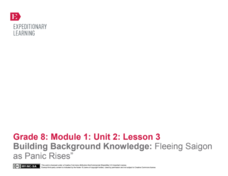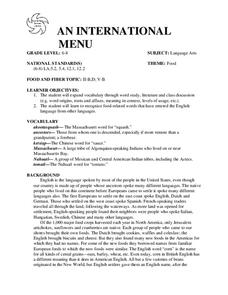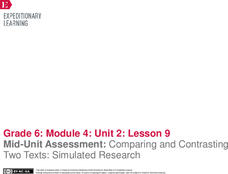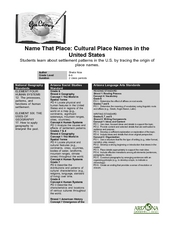Curated OER
Utilizing Vocabulary
You can use flip books as a means to practice and apply new vocabulary in any content area.
Curated OER
Suffixes
Eighth graders determine the meaning of vocabulary words using linguistic roots and affixes. In this vocabulary lesson plan, 8th graders discuss examples of suffixes and their meanings. Students find the root words and suffix from a list...
Curated OER
It's All Greek and Latin to Me!
Give your pupils a skill they can use for life by introducing the use and comprehension of Latin and Greek root words.
EngageNY
Summarizing Complex Ideas: Comparing the Original UDHR and the "Plain Language" Version
The eighth lesson plan in this series continues the focus on vocabulary and increasing young readers' awareness of academic language. Pairs of learners participate in a short vocabulary review activity called Interactive Words in which...
EngageNY
Building Background Knowledge: "Fleeing Saigon as Panic Rises”
How can scholars better understand the refugee experience? Pupils read Fox Butterfield's article "Panic Rises in Saigon, but the Exits are Few" and connect it to the novel Inside Out & Back Again. They annotate the text, looking for...
Curated OER
AN INTERNATIONAL MENU
Studentsl expand vocabulary through word study, literature and class discussion (e.g. word origins, roots and affixes, meaning in context, levels of usage, etc.). They recognize food-related words that have entered the English language...
Curated OER
Context Clues
Young scholars practice identifying the meanings of unknown words using context clues. In this vocabulary lesson, students read sentences which contain an unknown words. They will use the context of the sentence to determine the meaning.
EngageNY
Mid-Unit Assessment: Comparing and Contrasting Two Texts: Simulated Research
Shoo fly. Scholars read DDT Spray Scares Mosquitoes Away, Study Finds and You Think You Have It Tough? to complete a mid-unit assessment. The learners compare and contrast author presentation and conduct a credibility check on each...
Curated OER
Using a Dictionary
When do we use dictionaries? Provide this dictionary scavenger hunt for your youngsters. Third and fourth graders search for words, recording the number of syllables or definition for a variety of words. Get your class using dictionaries...
Curated OER
Using A Dictionary
Students explore English by completing a word definitions worksheet. In this dictionary lesson plan, students practice locating a list of vocabulary terms in a "Dictionary Race." Students complete a worksheet based upon word cards and...
Hawaiʻi State Department of Education
Making Dances From Stories
After reading a short story, learners will create dances that show homophones and verbs. Their dance sequences involve three verbs and transition movements in between each verb. Tip: Have the class dance out the sequence of events from...
Houghton Mifflin Harcourt
Grade 4 Reading Item Specifications
Is it the end of the school year and you're in need of test practice? Use a set of reading passages to challenge fourth graders to answer questions based on what they read. Some of the questions require readers to compare and contrast a...
Curated OER
Food Pyramid Menu
Young scholars analyze the food pyramid. For this food pyramid lesson, students evaluate their nutritional needs. Young scholars record their eating habits and determine if their food choices were healthy.
Alabama Learning Exchange
Echolocation Stations: Exploring Sound
Fourth graders explore the concept of echolocation during a unit on whales. They listen to the book and watch the Reading Rainbow video for "Humphrey: The Wayward Whale," explore various websites, and conduct experiments to demonstrate...
Curated OER
Name That Place: Cultural Place Names in the United States
Students examine the origin of the people that settled in the United States. In this United States History instructional activity, students work in small groups to complete several activities that explore early settlement, such as a...
Curated OER
Centipede or Millipede?
Students discuss millipedes and centipedes in terms of their classification as arthropod. Using a diagram, students categorize and compare and contrast the characteristics of millipedes and centipedes based on their discussion of...
Texas Education Agency
Texas Gateway: Reading: Understand New Vocabulary Using Roots and Affixes
In this lesson, you will learn about two kinds of affixes - prefix and suffix. Prefixes are attached, before a root or base word, and suffixes to the end of a word. You'll learn how all three word parts are keys to unlocking the meanings...
Texas Education Agency
Texas Gateway: Understand New Vocabulary Using Roots and Affixes
Learn how to determine the meaning of grade-level academic English words derived from Latin, Greek, or other linguistic roots and affixes.
Texas Education Agency
Texas Gateway: Understand New Vocabulary Using Roots and Affixes
Determine the meaning of grade-level academic English words derived from Latin, Greek, or other linguistic roots and affixes.
Texas Education Agency
Texas Gateway: Understand New Vocabulary Using Roots and Affixes
Determine the meaning of grade-level academic English words derived from Latin, Greek, or other linguistic roots and affixes.
Texas Education Agency
Texas Gateway: Understand New Vocabulary Using Roots and Affixes
This lesson focuses on learning new vocabulary by using prefixes, suffixes, and roots. It includes a brief history of affixes and learning exercises.
Texas Education Agency
Texas Gateway: Linguistic Roots and Affixes (English Ii Reading)
[Accessible by TX Educators. Free Registration/Login Required] You will be able to recognize linguistic roots and affixes to use in determining the meaning of academic English word and in other content areas.
Reading Rockets
Reading Rockets: Reading Topics a to Z: Root Words, Roots, and Affixes
An introduction to using word parts to improve vocabulary skills. Includes charts of common Greek and Latin roots as well as common prefixes and suffixes and their meanings. Each of the four charts can be downloaded.

























